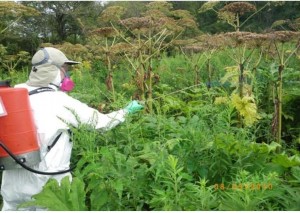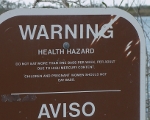A posted announcement by the U.S. Department of Agriculture caused quite a stir on Wednesday when it appeared to embrace the “Meatless Monday” campaign until it heard from the beef industry. Oops!
|
|
|||
|
U.S. Food and Drug Administration issued an order to restrict unapproved use of cephalosporin class of antibiotics in farm animals. Many, however, are critical of the agency’s decision to regulate a practice that is already in decline. Is glyphosate a critical tool to control weeds or a cancer-causing health and an environmental menace? The U.S. and Canadian governments plan to re-evaluate the safety of glyphosate. The Future of Food conference can be neatly summed up by this timeless aphorism uttered by Mahatma Gandhi: You must be the change you want to see in the world. Let’s get to work! At least one African government petitioned to include the paraquat herbicide formulation in the Annex III of the Rotterdam Convention. This could have far reaching consequences for the export of the herbicide. New FDA data shows that almost 80% of all antibiotics sold in 2009 were reserved for animal farming. Part two of our series on antibiotic overuse in healthy farm animals examines the response from the FDA and the proposed legislation. With Non GMO Month around the corner, let’s return to the basics: why avoid GMOs? Among concerns, human and animal health, environmental impact, morals and ethics, socioeconomic issues, and food labeling. From the company that brought you plastics and rubber (DuPont) comes a genetically modified soybean that is altered to exhibit alleged health benefits. In a somewhat positive news for consumers, Hunt’s ketchup product line will no longer contain contain high fructose corn syrup, ConAgra Foods announced on Monday. The high fructose corn syrup will be replaced with sugar from sugar cane. A recent study conducted by the U.S. Geological Survey found that ALL fish tested from 291 freshwater streams across the United States was contaminated with mercury. Pharma wastes are identified by the EPA “contaminants of emerging concern,” and have been linked to multiple health and developmental problems in aquatic animals. Because of the potency of the drugs and their prevalence in our waterways many believe that their presence may also affect human health and addressing this illegal water pollution needs to be a high priority in our governments. Recently, a New York Times article exposed the practices of the ground beef industry and inadequacies in USDA’s oversight. The industry’s desire to cut costs and the failure of the regulatory agency to have and/or implement safety protocols, has, at times, resulted in dire consequence. Taking a step in the right direction, the Obama Administration announced on July 14, 2009, that it will seek to ban the routine use of antibiotics on healthy farm animals. With the rise of antibiotic resistant bacteria, such as new strains of staph and strep, and waves of swine flue and the bird flue in recent history, it would seem illogical and dangerous to society as a whole for continuing the practice of feeding healthy farm animals antibiotics simply to encourage rapid growth. |
|||
|
 |
|||









